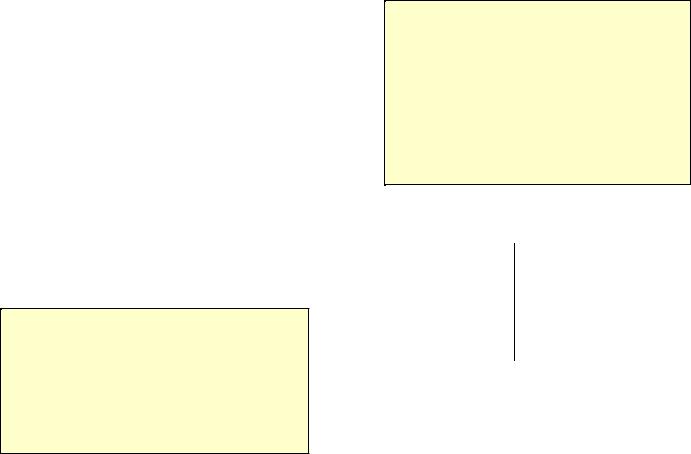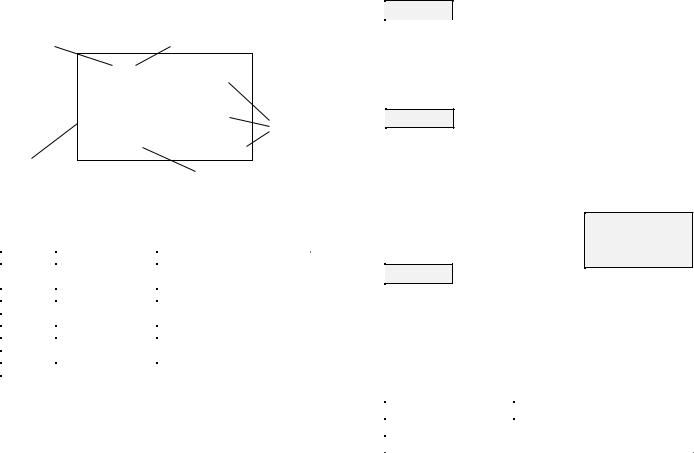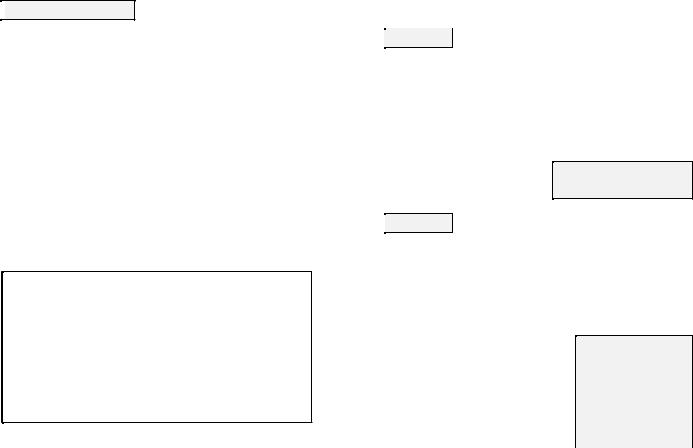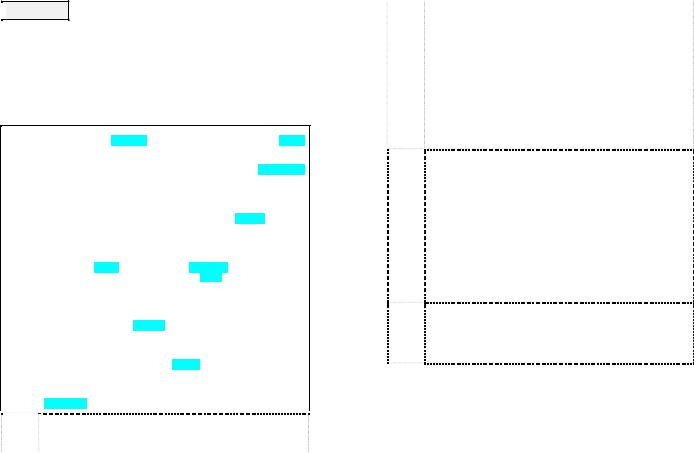
Learning to learn in English
.pdf
2.What are these universities famous for? Make sentences adding any information you know about them e.g.:
|
famous |
|
|
prestigious |
|
|
world-known |
|
Humboldt University is the |
ancient |
German university located |
first |
||
|
largest |
in the city of Berlin. |
|
… |
|
3.Answer the questions about the university you study at.
a)What is your university famous for?
b)What levels of study are available?
c)Where is the university located? Is it a campus or non-campus university?
d)Does it offer accommodation for the students?
e)What fields of science does the university provide courses in?
f)Is your university prestigious in the country or in your region? Why?
g)Have any graduates, faculty members won world famous prizes? Who?
 Get real
Get real
Study the web site and Prospectus of your university or faculty. Then write an advertisement of your own for university applicants. Use MIT advertisement as an example.

 Reading
Reading
1. Work as a class. Check you know these words and phrases:
undergraduate/postgraduatelevel |
qualification |
compulsory subject |
|
modular course |
optionalsubject |
elective subject unit of study |
|
creditpoints |
subject area |
assessment |
associated fieldofstudy |
2.Read the text about the British system of higher education. And complete the notes.
First degree courses in the UK
The UK hasan excellent reputation for higher education and research. It offers a lot of opportunities to both national and international students at undergraduate and postgraduate level.
Degrees
Thedegreesvaryaccordingtothe practiceofeachuniversity.Firstdegrees after leaving school are often called undergraduate.
Arts, social science and pure science degrees normally last 3 or 4 years becausetheyaredesignedtofollowaveryspecializedschool-leavingqualification. Traditionally university graduates will be awarded the degree of Bachelor ofArts, Science, Engineering, Medicine etc. Later they may continue to take graduate or postgraduate courses.
There is a another higher educational qualification in the UK, known as the Higher National Diploma or HND. It lasts a year less than a degree course – either two full-time or three years as a sandwich course. HNDs are vocational (or job related), so a studentwill not find theminpurelyacademic subjectsas history or philosophy. They are available in, for example, science subjects, engineering, business studies, hospitality and tourism management.
Course structure
Nowadays many institutions are changing the way in which their courses are structured. First degree courses in business studies, engineering, science and technology that allow studentsto undertake practical training are known as sandwich courses and include periods of work experience in industry and commerce.
The new modular schemes offer the opportunity to design a programme of study which suits particular student’s interests. A modular course is made up of a number ofself-contained unitsofstudy.These units, or modules, count towards final qualification – whether it is a first degree or a Higher National Diploma. The final qualification is of the same value as one which has a traditional structure, but the way in which the course isorganized and assessed isdifferent. In a full-time programme the students will study between 9 and 12 modules each year. Some of themmay run for more than one termor semester.The work will be assessed at the end of each module, and each module a student successfully passes will give credit points which have a common value within the Credit Accumulation and Transfer Scheme, or CATS for short.
40 |
41 |

Choosing a course
In most modular courses students still choose the main field of study. This maytake the formofa single subject degree inbusinessstudies, for examples, or a joint degree in biology and information technology. A student has to take anumber ofcompulsoryor“core”modulesfromalistofoptional subjects, either within the specialist subject(s) or in an associated field. A student may also be able to choose modules from completely different subject areas. These are called “elective” subjects and can provide you with additional employment skills, or an opportunity to broaden your academic interests. Options range from language to computer skills, from accounting to fine art courses. In some institutions students may start with a broader choice of subjects and decide which modules to take as they move through the course. In order to gain professional qualifications, it is important to cover the necessary modules which are usually specified in institutions’ prospectuses.
One of the advantages of the modular scheme is that it enables students to choose the topics of professional or general interest and to take modules outside the normal range of studies. Also the end-of-module assessment makes it easier for a student to monitor the progress.
However, there are some difficulties in studying on a modular course. With a new choice ofmodules eachterm or semester a student will have more decisions to make. The assessment process means that tutors for different modules may require a lot of planning. Nevertheless, modular courses are very flexible. Through CATS scheme, a student can transfer credit points from one institution to another, and study in more than one country.
(Adapted from http://www.universitiesuk.ac.uk/)
Degrees
_______________ ( 3– 4 years) and HND (stands for ___________________ ) HNDs are ___________________________ (or job related).
Later they may continue to take ____________________________________ .
Course structure
1.Sandwich courses allow _______________________________ and include
___________________________________ .
2.A modular course is made up of ___________________________________
Course organization
1. A full-time programme will require ________________________each year.
2.Students have to take a number of _____________ or “core” modules and
_____________________ within the specialist area or in an associated field.
3.A number of _______________ modules are available. They focus on
_______________________________________________________________
Advantages
1.Flexibility: ___________________________________________________
2.Easier to monitor the progress through _____________________________
Disadvantages
1._____________________________________________________________
2._____________________________________________________________
Questions
1.What is CAT? _________________________________________________
2.Where can I study a modular course?_______________________________
Comprehension check
1.Match words in column A with the words in column B to make phrases related to education
|
A |
B |
1) |
sandwich |
a) work |
2) |
course of |
b) qualification |
3) |
professional |
c) method |
4) |
business |
d) course |
5) |
work |
e) subject |
6) |
teaching |
f) study |
7) |
course |
g) training |
8) |
practical |
h) experience |
9) |
academic |
i) studies |
2.Look back into the text and find the words and phrases that go with the following verbs:
offer |
use |
design |
do |
take |
undertake |
What other wordsthey often go with? Look in the dictionary if necessary.
42 |
43 |

Focus on Language
1. Look at this extract from the Lingvo Dictionary.
The pronunciation in phonetic symbols
The part of speech (n. = noun, v. = verb)
Book [ buk ] n. 1. книга; 2. литературное |
|
произведение; |
|
v. 1. записывать, регистрировать; |
|
2. заносить в список; 3. заказывать, |
|
бронировать места, продавать билеты |
|
(обычно заранее); приглашать, |
|
договариваться |
The |
adj. книжный, ~ learning – теоретические |
translation |
знания |
|
Information in brackets (…) helps you |
~means repeat the word |
to choose the right translation or shows |
|
whichcountrythis wordis widelyused in |
|
2.These words have more than one meaning. Use a dictionary to find out which part of speech they are and what meanings they have. Write two sentences to demonstrate different meanings of every word.
|
Sentence 1 |
Sentence 2 |
book |
I’ve bought a new |
Have you already booked a room at |
|
book. |
a hotel? |
train |
|
|
last |
|
|
course |
|
|
honour |
|
|
subject |
|
|
degree |
|
|
way |
|
|
What do you think?
Would you like to study abroad?
What degrees are awarded in Russian universities?
Which elements of British system of higher education would you introduce in your university? Why?
 Get real
Get real
Visit the websites of the world famous universities to find out:
degrees that they award in your field of science
courses available – traditional, modular, sandwich, etc.
admission requirements
forms of classes
 Speaking
Speaking
1.Work in pairs. Make a list of questions you would like to ask a university representative to find out as much as possible about the university/ department you are hoping to study at. Make sure you ask about: variety of courses the university/faculty offers, degrees it awards, forms of teaching and methods of assessment used, tuition fees, facilities.
2.Change the partner. Take turns to ask each other about the university you have read about.
 Writing
Writing
Managing your learning
Make use of every opportunity you get to practice speaking in class. Role-plays help you prepare for a real-world experience.
1.Answer the questions:
Have you ever filled in an application form?
How did you feel about doing it?
Are you good at filling in the forms?
What sort of information do you have to provide?
2.Application forms mostly ask for information rather than ask questions. Match a line in A with a question in B.
|
A |
B |
|
|
|
1) |
First name |
a) Where are you living at the moment? |
|
|
|
2) |
Surname |
b) Are you married or single? |
|
|
|
44 |
45 |

3) |
Date of birth |
a) |
Where were you born? |
|
|
|
|
4) |
Country of origin |
b) |
What’s your surname? |
|
|
|
|
5) |
Present address |
c) |
Where do you live? |
|
|
|
|
6) |
Permanent address |
d) |
What do you do? |
|
|
|
|
7) |
Marital status |
e) |
When were you born? |
|
|
|
|
8) |
Occupation |
f) |
How much do you earn? |
|
|
|
|
9) |
Annual income |
g) |
What’s your first name? |
|
|
|
|
3.Fill in an application form for admission. Write in block capitals. Put N/ A if the information is not applicable. 
Application Form
for admission as an undegraduate student
1. Personal information
Title__________________________________________________Mr/Mrs/Miss
Surname_________________________________________________________
First Name(s)_____________________________________________________
Date of birth (use figures only): date______ month_________ year__________
Place of birth______________________Citizenship______________________
Home address: street and house_______________________________________
city_________________country__________________postcode_____________
Telephone (country, area code/phone number)___________________________
Email___________________________________________________________
Mailing address (if different from home address)_________________________
________________________________________________________________
________________________________________________________________
2. Disability/special needs
If you would like to receive information on support for students with a disability
tick here_______
46
3. Prefered field of study
o first choice________________________________________________
o second choice______________________________________________
othird choice_______________________________________________
4.Which semester are you applying for? _____________________________
5.University entrance qualifications:
Type (gymnasia, lyceum, comprehensive school, vocational school, technical school)__________________________________________________________
Date of completion_________________________________________________
Average grade (not necessary for foreign certificates)_____________________
6.Professional training/practical training (please include references) Professional qualification ___________________________________________
Duration of training from________________until________________________
7.Professional experience after training and/or other working experience
(for more than 8 weeks, include references)
o __________________________________________________
o __________________________________________________
o__________________________________________________
8.University/college previously attended (if you havepreviously been registered asa full-time studentatauniversity/college,pleasesupply allinformation) Institution________________________________________________________
Qualifications completed/being studied________________________________
________________________________________________________________
Field of study ____________________________________________________
Dates___________________________________________________________
Date _____________________
Signature _________________
47


 In the Realm of Science
In the Realm of Science
1. In education as well as in many other spheres of our life there are a great number of abbreviations. Read and remember the abbreviations to do with the degree titles, e.g.: BS stands for Bachelor of Science.
Do all of them have Russian equivalents?
A.S. Associate of Science (USA)
A.A.Associate of Arts (USA)
A.A.S. |
Associate of Applied Science (USA) |
BS |
Bachelor of Science |
BA |
Bachelor of Arts |
MS |
Master of Science |
MA |
Master of Arts |
MPhil |
Master of Philosophy (UK) |
MBA |
Master of Business Administration |
PhD |
Doctor of Philosophy |
Hons |
Honours |
HND |
Higher National Diploma (UK) |
2. What are degree titles in Russian education system?
Unit 1. Progress Monitoring
In this unit you have worked on the vocabulary related to the topic “Higher education”
undergraduate/graduateprogramme to take a course of study
vocational qualification
to award a (an honour) degree to undertake practical training to design a programme of study to receive marks/credit points classroom participation
Tick (V) thepoints youareconfident aboutand cross (X) theones you need to revise.
Unit 2 |
Your Personal Science Odyssey |
 Lead-in
Lead-in
1.Within 3 minutes with your partner brainstorm as many terms to do with natural sciences as you can. Compare your lists.
What natural science(s) do your terms refer to?
2.Read the definition of Astrobiology and in pairs answer the question: What does your field of science study?
Astrobiology studies the origins, evolution, distribution, and future of life in the universe.
Tool box: Giving definitions
…is a science / study of …
to study, to examine, to investigate, to describe, to deal with, to determine, etc.
 Reading
Reading
1.Look through the definitions of some natural sciences dealing with environmental issues. Match them with the right titles of sciences below. Mark the key words in each definition that helped you to make the right guess. One has already been done for you.
A …uses scientific background to the processes which affect the environment
and its management as well as considering the social, legal and policy implications of environmental issues.
B …usesa highlevelofmathematicaltechnique for the description and analysis of complex environmental systems. It needs complicated statisticalmethodsinthe design ofexperiments and interpretation of measurements in the monitoring of the environment…
48 |
49 |

C …is concerned with the health of our environment and the significance of pollution. It focuses around our ability to improve our understanding of the effects of pollution on plantsand animals and to develop early warning markers of organisms, population or environmental health.
D…isthe scientific studyof chemical and biochemical phenomena that occur in natural places. It deals with the behaviour of both natural and manmade substances in relation to atmospheric, aquatic and terrestrial environment.
E…isthescience oftherelationshipbetweenorganismsandtheirenvironments. It is the study of harmful effects of modern civilization on the environment, with a view toward prevention or reversal through conservation.
(Adapted from Lancaster University Undergraduate Prospectus Entry 2005)
1.Pollution Science (C)
2.Ecology ( )
3.Environmental Management ( )
4.Environmental Chemistry ( )
5.Environmental Mathematics ( )
 Speaking
Speaking
Which of the sciences listed below go with which sector of the diagramm accordingto itspopularitywithhighschool leavers?Givereasonsfor yourchoice.
7
1
6
2
5
4 3
Tool box: Making comparisons
… is more/ less interesting than … rewarding challenging prestigious perspective well-paid
difficult boring
…is harder/better/worse than …
…is the hardest/best/worst of all … most challenging
least difficult
a) Biological Sciences |
b) Chemistry |
c) Geography |
d) Computer Science |
e) Mathematics |
f) Ecology |
g) Physics |
|
|
Follow the model:
I think |
|
correspond(s) to |
|
|
In my opinion |
……… |
match(es) |
sector … |
because… |
As far as I know |
|
go(es) with |
|
|
 Listening
Listening
1. Work with a partner. Choose the correct explanation of the words and phrases below. Consult a dictionary if necessary.
1) |
If you study mammals you may probably deal with |
||
|
a) turtles |
b) monkeys |
c) bugs |
2) |
If you are determined to do something you |
|
|
|
a) hesitate for too long |
b) are afraid of it c) are resolute |
|
3) A specimen is a |
|
|
|
|
a) illustration |
b) example |
c) sample |
4) |
If you are embarrassed you feel |
|
|
|
a) confused |
b) angry |
c) impressed |
5) |
Aeronautic means something that is related to |
||
|
a) water |
b) air |
c) cosmos |
6) |
If you are embarrassed you feel |
|
|
|
a) confused |
b) angry |
c) impressed |
7) |
If you deal with glassware you should remember that it is |
||
|
a) sharp |
b) sticky |
c) fragile |
8)If you study the properties of a substance you study its
a)origin b) quality & characteristic c) possible applications
9)Phenomenon is a
a) fact or event in nature |
b) chemical reaction c) behaviour |
|
10) If someone is counseling you they are |
|
|
a) coping off you |
b) advising you |
c) prompting you |
11) When someone flunks at school or university they |
||
a) miss classes |
b) get awarded |
c) fail an exam |
12) If something is tough it is |
|
|
a) difficult |
b) heavy |
c) unpleasant |
13) If you are at loose ends you |
|
|
a) know exactly what you want to do |
b) feel relaxed |
|
c)have nothing to do
14)When you feel inspired by something you are
a) motivated |
b) confused |
c) happy |
50 |
51 |

15) If something is advanced it is |
|
|
a) basic |
b) higher &complex |
c) extraordinary |
2.Listen to three research scientists telling how they got interested in science. Identify each speaker. Tick (V) the correct piece of information about them.
Speaker 1 |
Speaker 2 |
Speaker 3 |
Speaker 4 |
a)Linus Pauling, Nobel Prizes in Chemistry and Peace
b)Silvia Earle, Biologist
c)Leon Lederman, Nobel Prize in Physics
d)Donna Shirley, Aeronautic engineer
Who…? |
Silvia |
Leon |
Donna |
Linus |
|
Earle |
Lederman |
Shirley |
Pauling |
as a child was determined |
|
|
|
|
about the future profession of |
|
|
|
|
a scientist |
|
|
|
|
loved reading popular science |
|
|
|
|
books for kids and science |
|
|
|
|
fiction books |
|
|
|
|
was inspired by stories |
|
|
|
|
describing explorations |
|
|
|
|
read books about insects and |
|
|
|
|
collected specimens of |
|
|
|
|
butterflies and beetles |
|
|
|
|
had a particular career in mind |
|
|
|
|
worked as a lab assistant in |
|
|
|
|
school |
|
|
|
|
gave lectures and wrote a |
|
|
|
|
book on world peace |
|
|
|
|
was fond of experiments |
|
|
|
|
chose the area of science |
|
|
|
|
unusual for a girl |
|
|
|
|
had at first difficulty studying |
|
|
|
|
at university/college |
|
|
|
|
3.Listen again and answer the questions.
a)Why did Sylvia Earle first want to be a veterinarian?
b)Why did she work as a laboratory assistant?
c)Why did Linus Pouling become interested in chemistry? What was his favorite journal?
d)Why did Leon Lederman get so impressed by Einstein’s book “Meaning of Relativity”?
e)How did Leon Lederman’s brother influence his choice of a career in science?
f)What do we call people who build airplanes?
g)Why did Donna Shirley get fascinated about Mars and space travel?
h)Why couldn’t she specialize in space at college?
i)Why did she have to study a lot during her Christmas holidays?
What do you think?
Are you happy with your choice of specialization? Why?/Why not?
How did you get interested in science?
What are your plans for the future? Do you have any particular career in mind?
Would you like to become a research scientist? Why?/Why not?
What else except for an inquisitive mind should one have to be a research scientist?
 Writing
Writing
Write a paragraph about your choice of specialization. Use the questions above as the guidelines to help you to organize your ideas and develop a
good piece of writing. 
Managing your learning
A paragraph is a group of related sentences that develop an idea.
In a paragraph there is usually one idea that is more important than all the others and it is commonly found at the beginning.
The main idea is supported by major details that grow out of it. There are also so called minor details that grow out of the major ones, i.e. examples, explanations, additional information, etc.
When you write, try to join your ideas with the linking words and phrases e.g., first of all, moreover, besides, actually, finally, as for, in any case.
When you have finished, re-read and check your work.
52 |
53 |


 Reading
Reading
1.You are going to read the text about the Combined Science (Natural Sciences) degree. Before you read the text, look up the word 'combine' in the dictionary.
2.According to the title of the course, what subjects do you think are included inthe curriculum? Work witha partner and discussyour opinions, make a list of subjects.
The Combined Science degree, which includes Natural Sciences, is founded
on Lancaster's tradition of flexibility and forward thinking. Following current interest in a broader, less specialized education we have brought together 25 departments offering 56 different courses from which you can take a degree adapted to your personal requirements. The scheme cuts through the conventional barriers between subjects, allowing combinations not only between the sciences, but also between the sciencesand the humanities or social sciences.
Most science degrees require a specialized study of a single subject even though the majority of science graduates eventually follow careers which would be better served by a broader, less specialized education providing relevant experience in, for example, management, languages or social sciences. Our Combined Science degree is intended for those who have a particular career in mind (for example, scientific journalism/information technology and medical or research management). It provides a means of choosing those skills and disciplines which will assist such ambitions. In particular, mature students who wish to advance an established career
will find the wide choice provided by this degree well suited to their needs.
The programme of study is broad, but care has been taken not to sacrifice academic excellence. In each degree a combination of three themes makes up the second and third years. One of these may be a non-science theme. In each subject there is a Combined Science tutor who advises students on their course choice.
The Natural Sciences option is available to those who wish to take at least two natural sciences as Themes. They are biological sciences, chemistry, environmental science, mathematics and physics.
The University is planning to offer a scheme called Technology, People and
Business for those wishing to specialize in the applied science area.
About one-third of the first year and of the final degree (second and third years) is based on coursework, including essay, tutorial, laboratory and project work. A number of our graduates have taken up PhD studies, teaching diplomas, and MS’s courses in
additionto employmentin a wide range of area.
Biological Sciences: |
Computing: one of |
Geography: |
||
biochemistry |
|
computing (broad |
|
physical geography |
microbiology |
|
course) |
|
human geography |
genetics/ |
|
systems architecture |
|
|
Group A |
Science Theme |
Group B |
-science Theme |
|
Non |
Group C |
Introductory courses |
microbiology
genetics
biomedicine
ecophysiology
organisms & environment
auatic ecology
terrestrial ecology
Chemisry:
inorganic chemistry
organic chemistry physical chemistry
Culture, media & communication Economics:
topics in economics
Education:
education & society
teaching and learning
History of Science
Philosophy
biology, a selection of topics
basic German
basic Italian
basic Spanish
|
software engineering |
Mathematics: |
|
|
information processing |
|
discrete mathematics |
Engineering: |
|
mathematical analysis |
|
|
statistics |
||
|
electronic engineering |
Physics: |
|
|
mechanical engineering |
||
Environmental Science: |
|
physical electronics |
|
|
materials |
||
|
atmospheres & oceans |
|
particle physics |
|
environmental |
|
|
|
management & systems |
Physiology: |
|
|
geological studies |
|
experimental |
environmental chemistry |
|
physiology |
|
Management: |
Linguistics: |
||
operations management |
text & speech |
||
management science |
|
processing |
|
Marketing |
Politics: |
||
|
|
|
international |
Modern languages: |
|
politics & security |
|
|
French Studies |
|
political analysis |
|
German Studies |
|
international |
|
Italian Studies |
|
politics, third |
Spanish Studies |
|
world issues |
|
|
|
Sociology: |
|
|
|
|
sociology of |
|
|
|
industrial |
|
|
|
societies |
|
history of science, |
|
physics, concepts |
|
independent studies |
|
sociology |
|
philosophy |
|
environmental |
|
physics, basic |
|
science, |
|
|
a selection of topics |
|
Comprehension check
1.Read the text more carefully and answer the questions.
a)How many departments are involved in training students in the Combined Science course?
b)Who may find this course most attractive?
c)Doesthe combinedcourse provide anyparticular career opportunities? What are they?
54 |
55 |

d)How many natural sciences can a student take?
e)Who can help students to make the right choice of the subjects?
2.Which of the highlighted wordsin the text match the following definitions?
a)valuable and useful to people in their lives and work
b)work that you do to earn money
c)a part which combines with other parts to form something bigger
d)ability to bend or change
e) able to be obtained, used, or reached f) no longer young
g) present time, modern, up-to-date h) to develop or improve something i) traditional
j)something which has practical use
k)is right for a particular person, situation or occasion
l)a part of a subject or activity
Focus on Language
1.Read the sentences below and study the models in the box.
About one-third of the first year is based on course work.
A number of our graduates have taken up PhD studies.
Subject and verb agreement
1)Singular expression (a lot of) + plural noun/pronoun+ plural verb
2)Oneof
Eachof |
|
+ plural noun + singular verb |
|
3)Some of + singular noun+ singular verb
4)Some of + plural noun+ plural verb
names of quantities
5) Plural expressions: plural names of countries or sciences + singular verb more than one + singular noun
6)a number of + plural noun + plural verb
7)the number of + plural noun + singular verb
Practice
1.Match the sentences below with the right model in the box. Translate the sentences into Russian.
a)A number of applicants have already been interviewed.
b)The number of students in the class is twelve.
c)Some of the book is good.
d)Some of the books are good.
e)One of my friends has got a grant for his research project.
f)Thirty minutes isn’t enough time to finish this test.
g)A lot of social problems are caused by unemployment.
h)Economics is George’s favorite subject.
i)More than one person is going to take up a course in programming.
j)Two thirds of money is mine.
k)The USA is smaller than Russia.
2.Choose the correct form of the verb.
a)Surveys show that the majority of school leavers (consider/considers) a university degree a good starting point for their future career.
b)Look! Half of the map (is/are) missing. We need another map!
c)Each of the students (has/have) a notebook.
d)A number of students in the class (speaks/speak) English very well.
e)Why (was/were) some of the students absent from classes?
g)My teenage brother thinks there (is/are) a number of good reasons for staying up late and having a good time.
h)Statistics (is/are) a branch of mathematics.
i)A lot of students clubs (is/are) opening these days.
j)More than one computer in this lab (has/have) broken down.
 Speaking
Speaking
Work in groups. Look through the scheme of the degree course in Combined Science offered in Lancaster University. Design a modular degree course that suits your particular needs and interests.
Writing |
Write a paragraphabout the modular course in Combined Science you would like to do. Give reasons for your choice of Themes from each group.
56 |
57 |


 In the Realm of Science
In the Realm of Science
1. Read the expressionsfor fractions, decimals and percentages:
1 |
one half, a half |
2 |
|
1 |
one third |
3 |
|
47 |
four seventh |
31 |
three and a quarter |
4 |
|
0.2nought point two
|
(zero) point two |
0,75 |
nought point seven five |
|
point seven five |
25,34 |
twenty-five point three |
|
four two five |
|
point three four |
1 % |
one percent |
78 % |
seventy eight percent |
90 % |
ninety percent |
It is interesting to know
The figure “0” has several different names.
“o” is used to talk bank accounts, telephone number, etc.
Nought used in British English to talk about a number, age, etc.
Nilis usedtotalkabout the scoreina team gameortomean“nothingatall”
Zero is used in precise scientific, economic, etc. contexts and to talk about temperature.
NB! In American English “zero” is  used in all contexts.
used in all contexts.
2.Work in pairs, A and B. Take turns to read and write down decimals, percentages and fractions you hear.
Student A: |
7.5 |
85.3% |
¾ |
70 % |
2½ |
18.03 |
Student B: |
3.68 |
34.9% |
⅔ |
90 % |
14 ⅛ |
13.75 |
Unit 2. Progress Monitoring
In this Unit you haveworked on the vocabulary related to thetopic “Higher education”:
|
specialized education/study |
|
research scientist |
|
to have a particular career in mind |
|
current interest in something |
|
to specialize in natural/social sciences |
to decide on something |
|
|
a combined science course |
|
barriers/between sciences |
|
scientific journalism; information |
|
a coursework; essay; tutorial; |
|
technology; research management |
|
laboratory; project work |
|
an applied science area |
|
to provide relevant experience |
|
the program of study |
to be a hands-on science |
|
|
to suit somebody’s needs |
|
lab procedures/equipment |
|
to read science-fiction books |
to make a career in science |
|
|
to have an inquisitive mind |
to set up one’s own research group |
|
Tick (V) the points you are confident about and cross (X) the ones you need to revise.
Unit 3 |
Revise & Practise |
1.Complete the following sentences with your own words. Use only present tenses.
a)One of my teachers …
b)A great number of first-year students …
c)A lot of news …
d)Each of the students …
e)The number of books on this subject …
f)The United Arabic Emirates …
g)Some of the information …
h)Mathematics …
2.Explain the similarity and difference between these pairs:
compulsory subject |
– |
optional subject |
undergraduate |
– |
graduate |
sciences |
– |
humanities |
exams |
– |
finals |
3.Write down a short vocabulary list (10 items) on the topic “Higher education”. With a partner compare your lists. Cross out the items you both have on your lists. Explain the meaning of the rest of the words and phrases.
4.Read the following sayings. Write a paragraph commenting on the one you like most.
“Geniuswithouteducationislikesilver inthe mine.” BenjaminFranklin
“The roots of education are bitter, but the fruit is sweet.” Aristotle
“Education isa progressive discovery of our ignorance.” Will Durant, U.S. author and historian.
“The direction in which education startsa man will determine his future life.” Plato
5.Game “Why physics or math, etc.?”
Work in teams. Hold a competition. Brainstorm as many plus sides of your specialization as possible. Compare your results.
58 |
59 |
